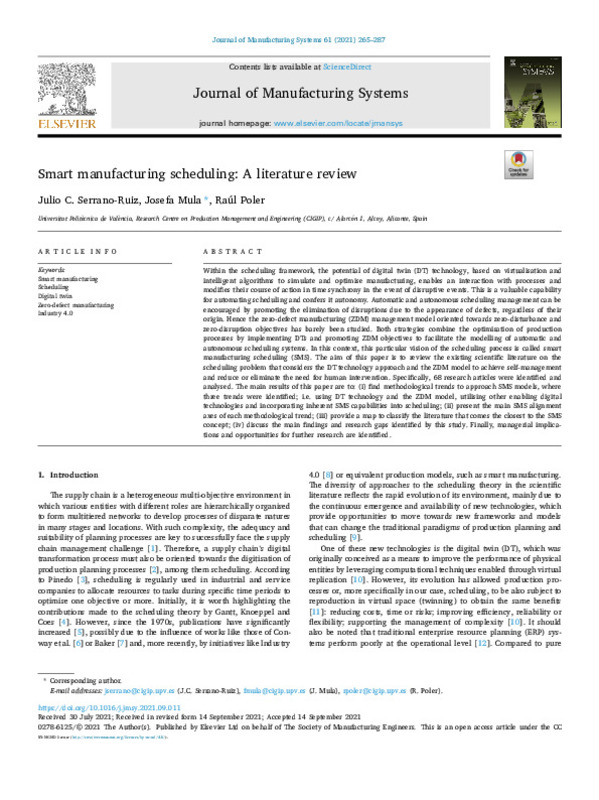JavaScript is disabled for your browser. Some features of this site may not work without it.
Buscar en RiuNet
Listar
Mi cuenta
Estadísticas
Ayuda RiuNet
Admin. UPV
Smart manufacturing scheduling: A literature review
Mostrar el registro sencillo del ítem
Ficheros en el ítem
| dc.contributor.author | Serrano-Ruiz, Julio C.
|
es_ES |
| dc.contributor.author | Mula, Josefa
|
es_ES |
| dc.contributor.author | Poler, R.
|
es_ES |
| dc.date.accessioned | 2022-06-08T18:06:15Z | |
| dc.date.available | 2022-06-08T18:06:15Z | |
| dc.date.issued | 2021-10 | es_ES |
| dc.identifier.issn | 0278-6125 | es_ES |
| dc.identifier.uri | http://hdl.handle.net/10251/183139 | |
| dc.description.abstract | [EN] Within the scheduling framework, the potential of digital twin (DT) technology, based on virtualisation and intelligent algorithms to simulate and optimise manufacturing, enables an interaction with processes and modifies their course of action in time synchrony in the event of disruptive events. This is a valuable capability for automating scheduling and confers it autonomy. Automatic and autonomous scheduling management can be encouraged by promoting the elimination of disruptions due to the appearance of defects, regardless of their origin. Hence the zero-defect manufacturing (ZDM) management model oriented towards zero-disturbance and zero-disruption objectives has barely been studied. Both strategies combine the optimisation of production processes by implementing DTs and promoting ZDM objectives to facilitate the modelling of automatic and autonomous scheduling systems. In this context, this particular vision of the scheduling process is called smart manufacturing scheduling (SMS). The aim of this paper is to review the existing scientific literature on the scheduling problem that considers the DT technology approach and the ZDM model to achieve self-management and reduce or eliminate the need for human intervention. Specifically, 68 research articles were identified and analysed. The main results of this paper are to: (i) find methodological trends to approach SMS models, where three trends were identified; i.e. using DT technology and the ZDM model, utilising other enabling digital technologies and incorporating inherent SMS capabilities into scheduling; (ii) present the main SMS alignment axes of each methodological trend; (iii) provide a map to classify the literature that comes the closest to the SMS concept; (iv) discuss the main findings and research gaps identified by this study. Finally, managerial implications and opportunities for further research are identified. | es_ES |
| dc.description.sponsorship | This work was supported by the Spanish Ministry of Science, Innovation and Universities project entitled 'Optimisation of zero-defects production technologies enabling supply chains 4.0 (CADS4.0) ' (RTI2018-101344-B-I00) , the European Union H2020 research and innovation programme with grant agreement No. 825631 "Zero Defect Manufacturing Platform (ZDMP) " and the European Union H2020 research and innovation programme with agreement No. 958205 "In-dustrial Data Services for Quality Control in Smart Manufacturing (i4Q) ". | es_ES |
| dc.language | Inglés | es_ES |
| dc.publisher | Elsevier | es_ES |
| dc.relation.ispartof | Journal of Manufacturing Systems | es_ES |
| dc.rights | Reconocimiento - No comercial - Sin obra derivada (by-nc-nd) | es_ES |
| dc.subject | Smart manufacturing | es_ES |
| dc.subject | Scheduling | es_ES |
| dc.subject | Digital twin | es_ES |
| dc.subject | Zero-defect manufacturing | es_ES |
| dc.subject | Industry 4.0 | es_ES |
| dc.subject.classification | ORGANIZACION DE EMPRESAS | es_ES |
| dc.title | Smart manufacturing scheduling: A literature review | es_ES |
| dc.type | Artículo | es_ES |
| dc.identifier.doi | 10.1016/j.jmsy.2021.09.011 | es_ES |
| dc.relation.projectID | info:eu-repo/grantAgreement/AEI/Plan Estatal de Investigación Científica y Técnica y de Innovación 2017-2020/RTI2018-101344-B-I00/ES/OPTIMIZACION DE TECNOLOGIAS DE PRODUCCION CERO-DEFECTOS HABILITADORAS PARA CADENAS DE SUMINISTRO 4.0/ | es_ES |
| dc.relation.projectID | info:eu-repo/grantAgreement/EC/H2020/825631/EU | es_ES |
| dc.relation.projectID | info:eu-repo/grantAgreement/EC/H2020/958205/EU | es_ES |
| dc.rights.accessRights | Abierto | es_ES |
| dc.contributor.affiliation | Universitat Politècnica de València. Departamento de Organización de Empresas - Departament d'Organització d'Empreses | es_ES |
| dc.description.bibliographicCitation | Serrano-Ruiz, JC.; Mula, J.; Poler, R. (2021). Smart manufacturing scheduling: A literature review. Journal of Manufacturing Systems. 61:265-287. https://doi.org/10.1016/j.jmsy.2021.09.011 | es_ES |
| dc.description.accrualMethod | S | es_ES |
| dc.relation.publisherversion | https://doi.org/10.1016/j.jmsy.2021.09.011 | es_ES |
| dc.description.upvformatpinicio | 265 | es_ES |
| dc.description.upvformatpfin | 287 | es_ES |
| dc.type.version | info:eu-repo/semantics/publishedVersion | es_ES |
| dc.description.volume | 61 | es_ES |
| dc.relation.pasarela | S\446681 | es_ES |
| dc.contributor.funder | AGENCIA ESTATAL DE INVESTIGACION | es_ES |
| dc.contributor.funder | COMISION DE LAS COMUNIDADES EUROPEA | es_ES |
| dc.subject.ods | 09.- Desarrollar infraestructuras resilientes, promover la industrialización inclusiva y sostenible, y fomentar la innovación | es_ES |
| upv.costeAPC | 3497 | es_ES |








